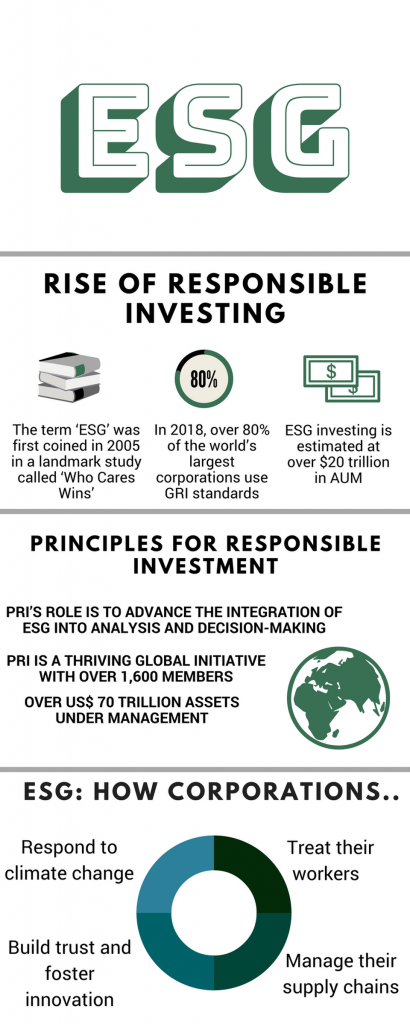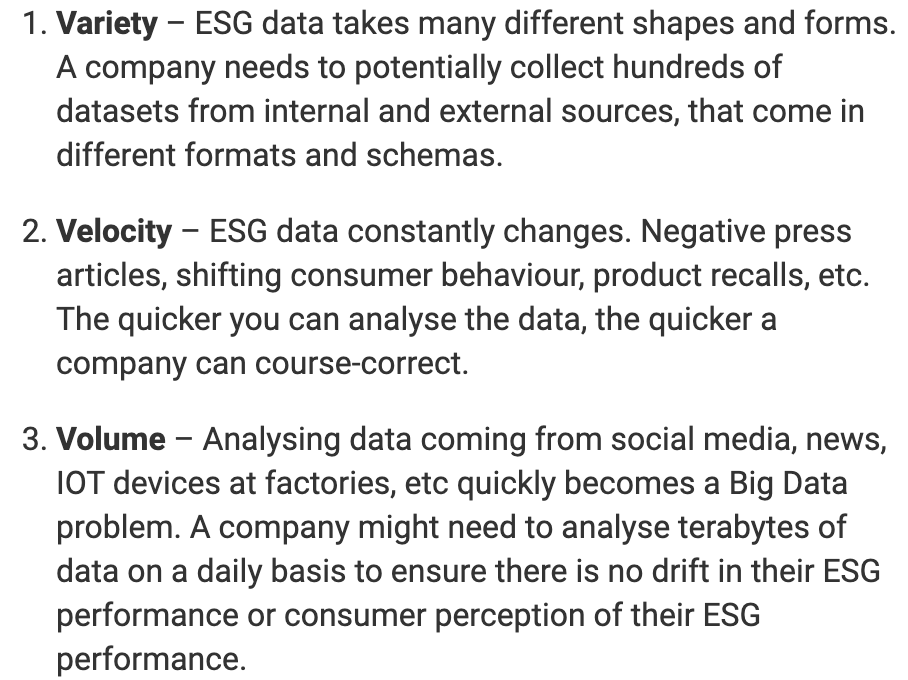AI’s role in ESG
There are a plethora of advantages involved with integrating Environmental, Social, and Governance (ESG) into a business’s objectives. ESG covers a broad spectrum of problems that are not traditionally acknowledged by investors, whose focal concerns are financial growth and returns. Though it is indirect, ESG is often pertinent to a company’s financial status. ESG can be used to shed light on how a business chooses to respond to issues such as: “climate change, how good they are with water management, how effective their health and safety policies are in the protection against accidents, how they manage their supply chains, how they treat their workers and whether they have a corporate culture that builds trust and fosters innovation” (Forbes).

Companies that have implemented ESG within their metrics must acknowledge the influence AI has had on the development of it. Artificial Intelligence technology has changed the game when it comes to being a socially responsible corporation. Yet, businesses that have begun their ESG journeys are often using time-consuming strategies that are not sustainable due to human limitations. Choosing automated approaches can help companies develop a more efficient response to “rapid changes in the economy, geopolitics, or consumer behavior” (Nakai).
Currently, companies do not have a unified method to gather, interpret, and report ESG info. For ESG to become normalized and implemented regularly within companies, artificial intelligence must perform a key role in the collection, analysis, and reporting of data. The adoption of Artificial Intelligence into ESG practices would save time, money, and centralize ESG.
False advertisement
The typical routine for ESG companies today is to disclose a self-regulated ESG report once a year. The reason why ESG reports occur on a yearly basis is due to how long and strenuous the process of collecting the demanded data for the reports can be. It is not easy to keep track of a “wide array of datasets, from carbon emission to diversity and inclusion (D&I) metrics” (Nakai). This is very discouraging for companies and dissuades one from starting their very own ESG journey. Since ESG discloses a variety of problems and is often self-regulated, the time consumer manner may result in a company cutting corners or inflating their numbers in order to save time if they are not organized in the data collection process.
“Without the ability to find, analyze, and disclose ESG performance data in a timely manner, ESG efforts are turning into marketing exercises that sometimes lack solid grounding. This is well documented in what is called “greenwashing”, a term indicating institutions misleading consumers and/or investors about the performance of their Environmental, Social, and Governance goals” (Nakai).
Nakai, J. (2020, August 04). How AI and data enables ESG to make real world impact. Retrieved August 29, 2020, from https://www.finextra.com/blogposting/19167/how-ai-and-data-enables-esg-to-make-real-world-impact
Problems like this can also result in fluffed up reports. There are a number of companies who claim to be sustainable and release near 100-page “reports” that speak about their sustainable values, beliefs, and goals; but only a couple of those pages show transparent numbers that actually represent their impact. This is a prime example of Green Washing.
Decent ESG standards will take years to centralize. Consumers and investors are more frequently demanding transparent and sustainable practices from companies they financially support.
For a company to prosper and be a top-rated ESG company, these brands need to discuss the bottom line data problems: Volume, Velocity, and Variety (Nakai):

If these issues are not properly addressed and considered, companies will continue to greenwash whether they mean to or not. Companies will not be able to understand their ESG standards well enough to move forward with more advanced technology, like AI, to aid in their ESG application.
Kell, G. (2018, July 31). The Remarkable Rise Of ESG. Retrieved August 29, 2020, from https://www.forbes.com/sites/georgkell/2018/07/11/the-remarkable-rise-of-esg/
Nakai, J. (2020, August 04). How AI and data enables ESG to make real world impact. Retrieved August 29, 2020, from https://www.finextra.com/blogposting/19167/how-ai-and-data-enables-esg-to-make-real-world-impact/


